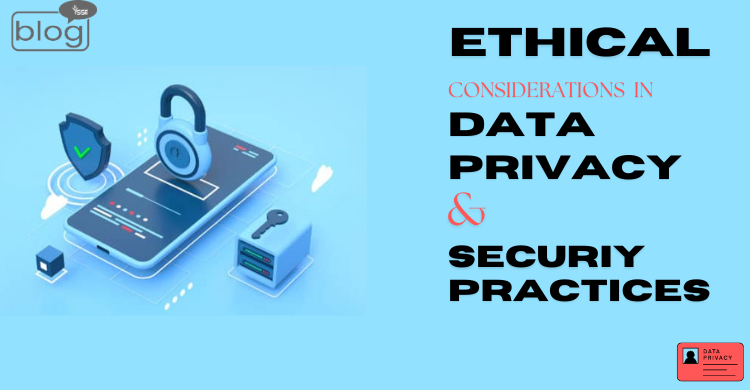We live in a world where digital progress evolves in seconds, data is the new currency, and innovation is the working power. This personalises experiences and shapes the world around us. However, having such immense power also comes with great responsibility: ensuring that security measures and data privacy are ethically solid. It’s not just a matter of maintaining the law but also protecting individuals from potential harm and respecting their basic privacy rights.
As we navigate this complicated landscape, we must question how much data sharing we are okay with. To whom is it available? Furthermore, how can we ensure it’s shielded against abuse? By creating candid dialogues, taking up strong security measures, and prioritizing users’ control, we can make a better future where data advantages are used responsibly. At the same time, there will be openness and trust between individuals and organisations.
Transparency:
Individuals must be aware of themselves to understand what information is being collected about them, for what reasons, and most importantly, who is being shared with. Organisations need to get accurate, informed consent – not just a box to be ticked on a form.
Privacy:
As we can see, more data is being gathered and processed in the blink of an eye, making it hard to keep the information safe and confidential. Privacy breaches have become a serious issue, causing problems like identity theft, harm to one’s reputation, and anxiety. Data privacy, however, has grown in complexity due to the numerous methods of aggregating users’ data and the diverse technologies used in the ever-growing digital ecosystem. Users generate large volumes of data, for example, via social media and online shopping, which can be assembled to form detailed profiles and potentially disrupt their privacy.
Consent:
Consent is required to handle health data, including its collection, processing, and storage. It’s a crucial instrument for preserving freedom, privacy, and secrets.
Accountability:
There is legislation around data protection, and organisations must prove that they comply. Organisations have an ethical imperative to take responsibility for their data practices. This means accepting responsibility for and proving data protection, demonstrating compliance with privacy regulations, and managing personal data breaches or misuse. Being accountable for data, therefore, signals a commitment to ethical data behaviour and builds trust.
Fairness:
Ethical data handling requires fairness and the avoidance of biases. Data collection, processing, and analysis should not result in unfair benefits or disadvantages to individuals and organisations. Sensitive attributes like gender, race, and religion cause disastrous problems when it comes to ethical data handling. Discramatory problems are caused by these issues.
Security and protection against breaches:
Organisations must safeguard data against unauthorised access, spamming, breaches, and cyber-attacks. We all know the importance of safeguarding the data if we know about the recent billion-dollar heist in Bangladesh Bank. Organisations must invest in solid security measures to protect sensitive information, which may cause havoc if it falls into the wrong hands.
Strategies for data privacy and security practices:
- Data governance framework: Organisations or individuals must build a comprehensive data governance framework that outlines policies, processes, and responsibilities regarding data collection, storage, and, most importantly, where and with whom the data should be shared.
- Training and education: Provide training to the employees. Educate them about the importance of data practices and services and how to handle data privacy regulations. Also, handle sensitive information like a pro.
- Privacy in design: Add privacy designs to the organisation’s structure. This will work as an output rather than as an afterthought.
- Audits and checks: By conducting regular audits and checks, we can ensure that data practices align with the organisation’s policy and procedures. We can also ensure that ethical standards and industry requirements are kept up with the system and the welfare of the customer and organisation.
- Connection with the stakeholders: Cooperate with stakeholders, including customers and employees. This helps gather feedback on data collection safeguarding and addresses concerns.
Ethical issues surrounding the use of data and its privacy and security practices are of great concern in today’s big data era. Organisations and societies must carefully balance individual rights and freedoms with the social benefits of innovation. Ethical guidelines for responsible data use include transparency, informed consent, and security. Guided by these principles, organisations can increase user trust, reduce risk, and practice good data practices in the ever-more-connected world.
To read more blogs like this, click here.
Mostofa Imam
Intern at Content writing department
YSSE

